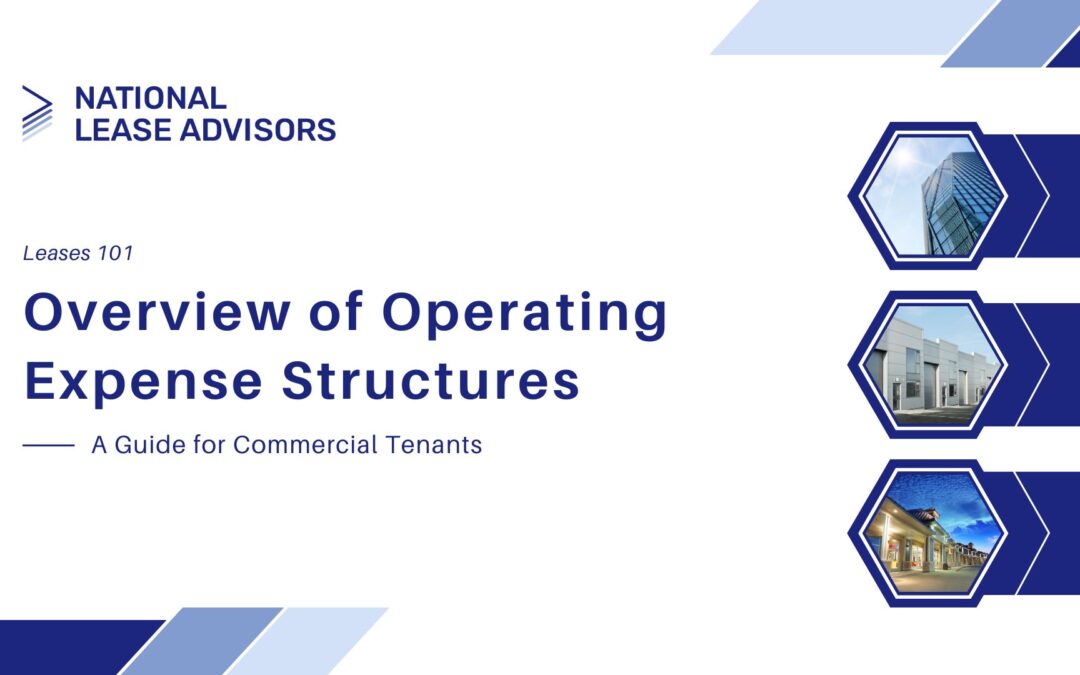In a commercial real estate lease, the operating expense structure outlines the costs associated with operating and maintaining the property. These expenses can include property taxes, insurance, maintenance, repairs, and utilities. Depending on the lease agreement, the tenant will likely be responsible for paying a portion of these expenses.
The operating expenses are in addition to the base rent and the structure of the lease will impact the base rent amount. For example, if two identical buildings are next to each other and one building has a NNN structure and one has a Base Year Structure
There are several operating expense structures in commercial real estate leases, and each structure is very different when evaluating total costs throughout a lease term. It’s also important to note that there is not universal terminology in the real estate industry and these may be referred to different names by different real estate professionals Here is a brief overview of the most common operating expense structures:
Triple Net Lease (NNN): In a triple net lease, the tenant is responsible for paying for its share of all the property’s operating expenses, including property taxes, insurance, and maintenance costs.
Base Year Lease: A base year lease is a type of commercial real estate lease where the tenant pays a base rent that is calculated based on the property’s operating expenses in a specified base year (usually the first year of the lease). The tenant is then responsible for any increases in operating expenses above the base year amount. Click here for a more detailed breakdown of this lease type.
Gross Lease: In a gross lease, the landlord is responsible for paying all the property’s operating expenses, and the tenant pays a fixed rent that includes all expenses. This structure is not too common, but may be seen with non-complex landlords and is preferred by tenants who want predictable and stable rent costs.
Modified Gross Lease: A modified gross lease is a combination of the triple net and gross lease structures. In this structure, the landlord and tenant agree on a base rent that includes some operating expenses, such as property taxes and insurance. These expense might also have a base year. The tenant is then responsible for paying a portion of the remaining operating expenses, such as maintenance and repair costs.
Absolute Net Lease: An absolute net lease is a type of lease where the tenant is responsible for all operating expenses, as well as any structural repairs or replacements needed during the lease term. In this structure, the tenant pays a base rent in addition to the operating expenses and structural repair costs. Absolute net leases are typically used in single-tenant buildings.
Expense Stop Lease: An expense stop lease is similar to a base year lease, except instead of the operating expenses included in the base rent being based on a certain years operating expenses, it is instead specified in the lease. When operating expenses exceed the expense stop, the tenant is responsible for paying the additional expenses. This structure is more rare than a base year lease, but we still see it.
The below table provides a simple overview of the operating expense cost a tenant might expect over a five year term under different lease structures. In this example, the first year expenses are $10.00 per square foot and increase at 5% per year.

The operating expense structure in a commercial real estate lease can have a significant impact on a tenant’s financial obligations. It’s important to understand each structure to accurately forecast rents over a lease term. Each structure has its advantages and disadvantages, and it is essential to negotiate the structure that best fits the tenant’s needs.
About National Lease Advisors: National Lease Advisors is a leading provider of lease administration services, specializing in helping businesses effectively manage their real estate portfolios. Their comprehensive range of services includes CAM reconciliation reviews, lease audits, rent statement analysis, and lease accounting. With a focus on quality service and client satisfaction, National Lease Advisors helps clients manage their lease portfolios effectively, reducing costs and optimizing their real estate strategy.

